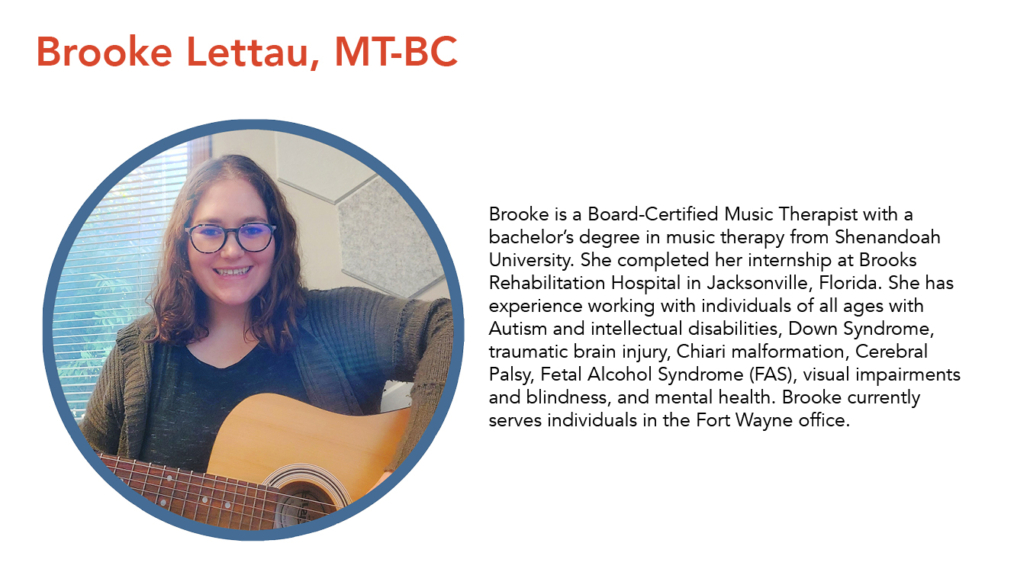What is Music Therapy?
“Music Therapy is the clinical and evidence-based use of music interventions to accomplish individualized goals within a therapeutic relationship by a credentialed professional who has completed an approved music therapy program.” –American Music Therapy Association
That’s great, but what exactly does this mean?
Let’s break it down.
“Clinical and evidence-based use of music interventions…”
- Music therapists use current research to design music interventions (music activities) that address individualized non-musical goals. Interventions may include but are not limited to: playing instruments, singing, movement, song writing, music listening, and so on. Also, music interventions used during sessions are based off individual preference.
“…to accomplish individualized goals.”
- Non-musical goals are based off the person’s individual strengths and areas of growth. Goals can target the following areas:
-
-
-
-
-
- gross and fine motor skills
- communication skills
- socialization skills
- academic skills
- emotional regulation skills
- develop coping skills
- decrease anxiety
- improve quality of life
- promote wellness
- manage stress
- enhance memory
-
-
-
-
“…by a credentialed professional who has completed an approved music therapy program.”
- Music therapists have at least a bachelor’s degree in music therapy from an AMTA (American Music Therapy Association) accredited school. Music therapy students log at least 1,200 clinical hours between practicum placements during coursework and a 6-month internship at an AMTA approved internship site. After completing their course work and an internship, the music therapy student sits for the music therapy board exam provided by the Certification Board of Music Therapists. Once they complete their course work, internship, and pass the exam they become a Board-Certified Music Therapist (MT-BC).
Why Music Therapy?
Music therapy can motivate individuals to engage in tasks for longer periods of time as well as make monotonous or mundane goals more fun to complete than traditional therapies.
Our Philosophy
- The services of Forte Residential Music Therapy are founded on the belief that individuals with disabilities are valued members of society and valuable to God. Every individual, regardless of ability or disability, should live with dignity, a positive social role, inclusion into the community, self-direction, and a feeling of self-worth. Individuals who require support are of great worth and should be held in high esteem. That God in the person of Jesus Christ and through the Bible has established moral and ethical truth, the basis for the conduct of all people.
- Forte Residential Music Therapy seeks to provide the highest standards of quality services to individuals served by following the standards of music therapy practice, working with the individual’s treatment team, advocating for the individual, and consulting with the individual’s parent/guardian. The music therapist will work together with the individual, parents/guardian, and other treatment team members to create personalized goals to improve the individual’s quality of life. Goals may include but are not limited to: improving gross and fine motor skills, improving emotional regulation, improving sensory regulation, improving communication skills, improving academic skills, improving executive functioning skills, decreasing anxiety, and more.
Services we provide:
-
- Waiver and private pay individual music therapy sessions.
- Waiver and private pay group music therapy sessions.
- Community enrichment classes
- Family therapy sessions
- Autism social groups
- Caretaker support groups
- Early Childhood Enrichment classes
- Mental health support groups
Service locations:
-
- We offer services in Allen County, Whitley County, and the surrounding areas.
- Music therapy sessions occur in our Fort Wayne office.
“My brother came to live with us in 2019. He lived in Fort Wayne and went to Easter Seals of Fort Wayne (ARC). Shawn loved this place. He had friends and a great support staff. When Shawn moved in with us, we wanted a place similar to ARC. A place to make friends and learn everyday living skills. We were put on waiting lists for a few organizations in town, when we came across Forte, Forte was able to get Shawn into music therapy with Jessica right away. Because of Forte Shawn was able to get back into a stable, everyday routine. Thank you Forte!!”
-The Browns
“Music therapy has changed my daughter’s life. Cochlear implant users typically do not appreciate music. But, my daughter loves it. Therapy at Forte has exploded her love for music! She now spends hours sitting on her bed, playing her guitar, singing her heart out. There was a songbird inside of her waiting to come out! The sweet part is that her songs now have meaning. We can understand her deaf words. Most importantly, she is learning to understand those words more and more. This has grown the JOY in her personal life so much!“
- American Music Therapy Association (AMTA) Website: https://www.musictherapy.org/
- The Association for Indiana Music Therapy (AIMT) Website: https://indianamusictherapists.com/
- Certification Board for Music Therapists (CBMT) Website: https://www.cbmt.org/
For more information or questions please contact Brooke at:
(574)549-9961 ext 2112
brookeh@forteresidential.org


